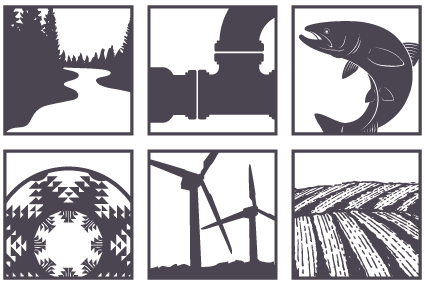Eligible projects must yield substantial benefits, have a well-defined scope of work, be feasible to implement within the grant term, and contribute to the goals of CAL FIRE’s Forest Health program and the NCRP Vision for North Coast Resilience Plan. All projects must include one or more activities supported by the Forest Health Program:
● Forest Fuels Reduction
– Eligible activities must focus on treating understory trees and brush with the goals of reducing fire hazards, improving tree growth, stabilizing carbon in retained trees, and increasing forest resilience to catastrophic disturbances. Forest thinning activities can be manual or mechanical and must be designed to change stand structure to: 1) concentrate carbon storage in widely-spaced and larger trees that are more resilient to wildfire, drought, and pest outbreaks; and 2) reduce the likelihood of wildfire transitioning into the forest canopy. Commercial harvesting activities should focus on promoting carbon storage in remaining trees and must be compatible with achieving resilient forests with stable carbon storage that provide co-benefits such as fish and wildlife habitat, increased biodiversity, and wildlife adaptation to climate change. Pre- commercial and brush removal activities are also eligible.
● Prescribed Fire
– Eligible activities must focus on the need to reintroduce fires to fire-adapted forest ecosystems. Applying fire to the landscape may serve multiple purposes including, reducing fuel loads, creating heterogenous and diverse vegetation, maintaining cultural practices of indigenous communities, and/or promoting healthy ecosystem processes such as water storage and pest control. Prescribed burns may be completed with private or public burn crews.
● Cultural Fire
– Distinguished from Prescribed Fire. Cultural Fire is the intentional application of fire to the land by an Indigenous person or cultural group (e.g., family unit, Tribe, clan/moiety, or society) to achieve cultural goals or objectives and based in Tribal or Traditional Indigenous law.
● Pest Management
– Eligible activities must address pest control and related forest health improvement, while reducing pest-related mortality, improving tree growth, stabilizing carbon retained in trees, and increasing forest resilience. Activities may include forest thinning and/or brush removal. Forest thinning activities (manual or mechanical) should change stand structure to increase carbon storage in more widely spaced trees that are more resistant to wildfire, drought, and insect attacks. Harvesting activities should focus on removing dead, diseased, suppressed, or slow-growing trees for the purpose of promoting carbon storage in remaining trees and must be compatible with achieving resilient forests with stable carbon storage that provide co-benefits such as fish and wildlife habitat, increased biodiversity, and wildlife adaptation to climate change.
● Reforestation
– Eligible activities should establish a diverse, native forest, which will result in stable carbon sequestration and storage, improved watershed and habitat functions, and forest resilience. Species selection must be appropriate for the site and may be used to address climate adaptation. Climate appropriate seed lots may be identified using the U.S. Forest Service’s Seedlot Selection Tool.
Reforestation of recently burned areas is also eligible for funding including planning, site preparation and planting; fire suppression repair costs are not eligible. The Forest Health program does not fund afforestation or the establishment of forests in historically non-forested areas.
● Biomass Utilization
– Eligible activities must:
1) Utilize woody biomass for wood products such as post and pole, firewood, dimensional lumber, plywood, or other products which allows for continued carbon storage
2) Generate energy though combustion or gasification, which displaces carbon-intensive fossil fuel- based energy; or
3) Utilize woody biomass to help develop markets for beneficial uses of the material. Beneficial uses include, but are not limited to, dimensional lumber, animal bedding, biochar, artistic and cultural products, cross-laminated timber, mulch, oriented strandboard, pulp, post, shredding, and veneer products.
Note: Modification of vegetation adjacent to roads may be an eligible treatment in a Forest Health project, if the roads are connecting large forested landscapes and are critical to maintaining forest health via forest fuels reduction, prescribed fire, pest management, reforestation and/or biomass utilization. Roadside fuel reduction to improve public safety (for egress of evacuating residents and ingress of responding emergency personnel) as a major project component is not an eligible activity for Forest Health grants.
All revenues collected as a result of activities paid for, in full or in part, with Forest Health Program grant funds must be tracked and re-invested into the project to further grant objectives.
Detailed information about the eligible project activities is excerpted and modified from the California Climate Investments, Department of Forestry and Fire Protection, Forest Health Program Grant Guidelines, December 2023 and can be found in Appendix A.


